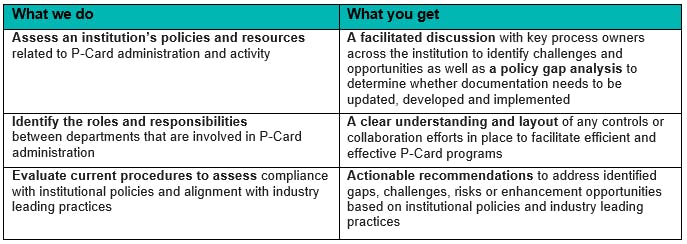Case study: P-Card assessment in action

Client need
Management for a private research institution requested that Baker Tilly perform an assessment of their P-Card program, which saw an annual spending of almost $11 million.
Baker Tilly solution
The Baker Tilly team met with key personnel (e.g., P-Card administrator, active cardholder and approving officials) and reviewed documentation to gain an understanding of the institution’s P-Card program and their challenges with administering an efficient and effective program. Our team also performed analytic procedures and detailed testing of transactions to assess program compliance and identify risk areas that may require additional preventive or detective internal controls on an ongoing basis.
Results achieved
During our assessment, we identified various key challenges, including the absence of authority for the P-Card administrator to effectively enforce the P-Card program, many active P-Cards with little to no activity and the failure of key controls intended to prevent and detect instances of P-Card fraud and misuse on an individual transaction level. We provided management with actionable recommendations to address the challenges identified and monitor future activity that could be indicative of questionable or unallowable transactions.
For more information on this topic, or to learn more about how Baker Tilly’s higher education internal audit specialists can help your institution, contact our team.


